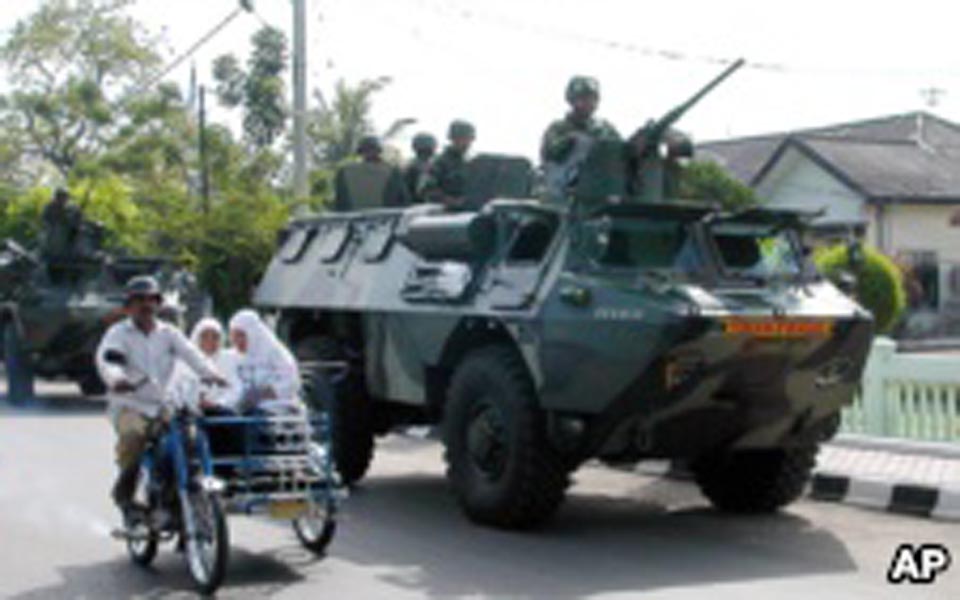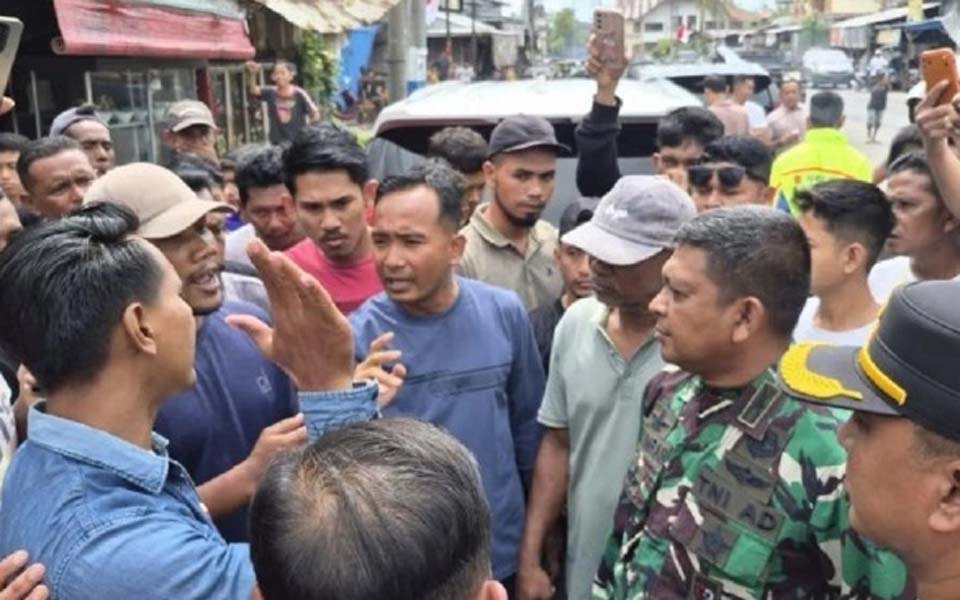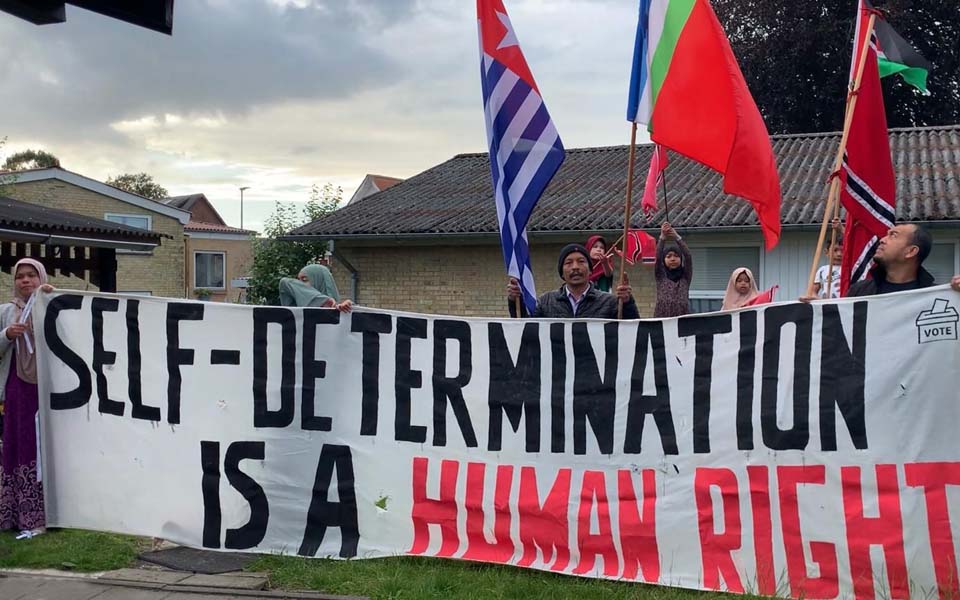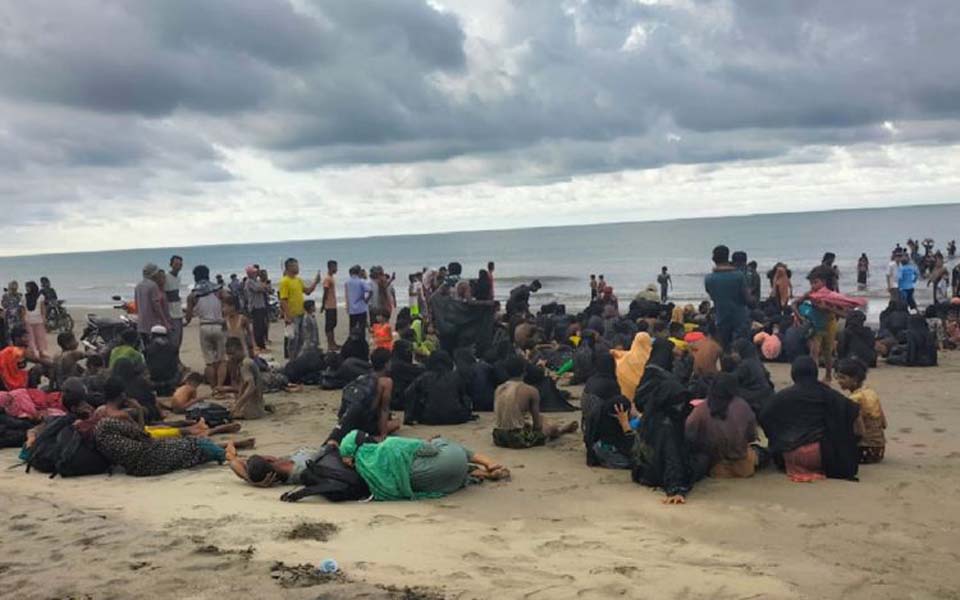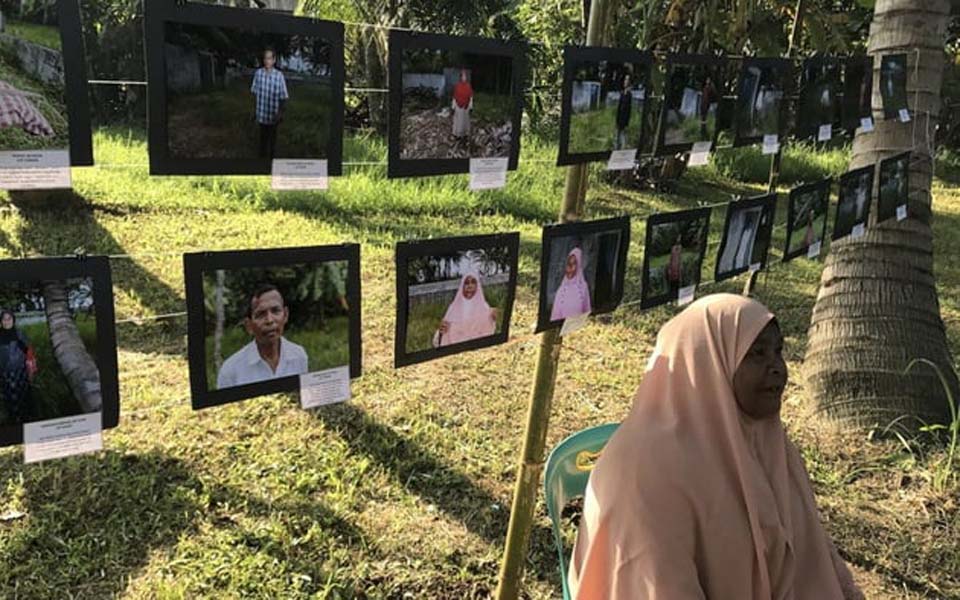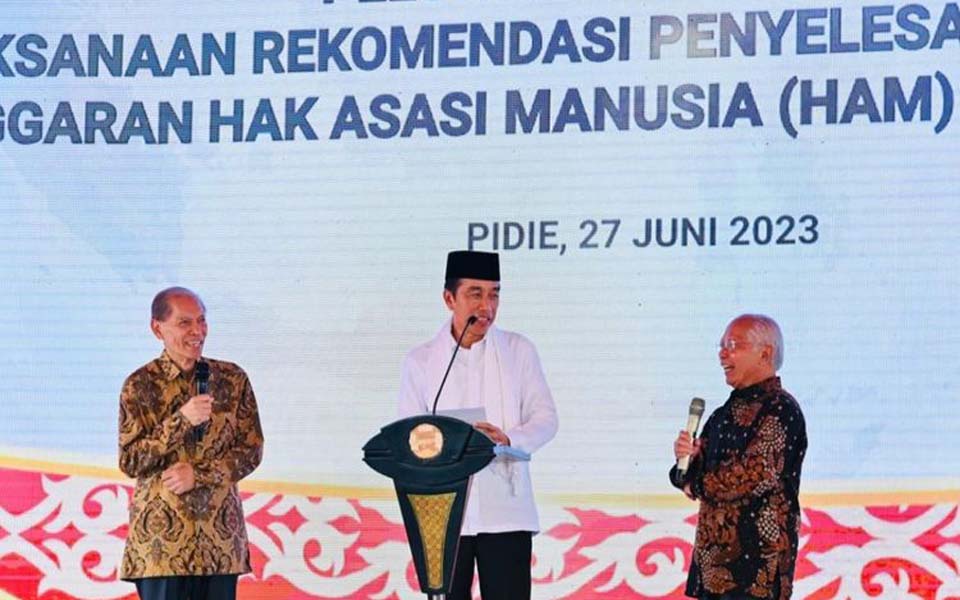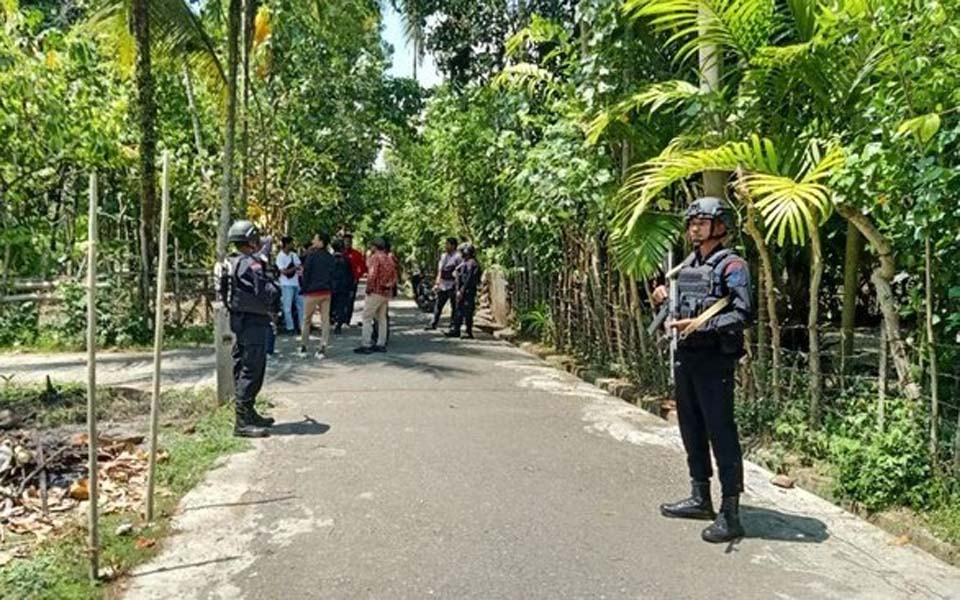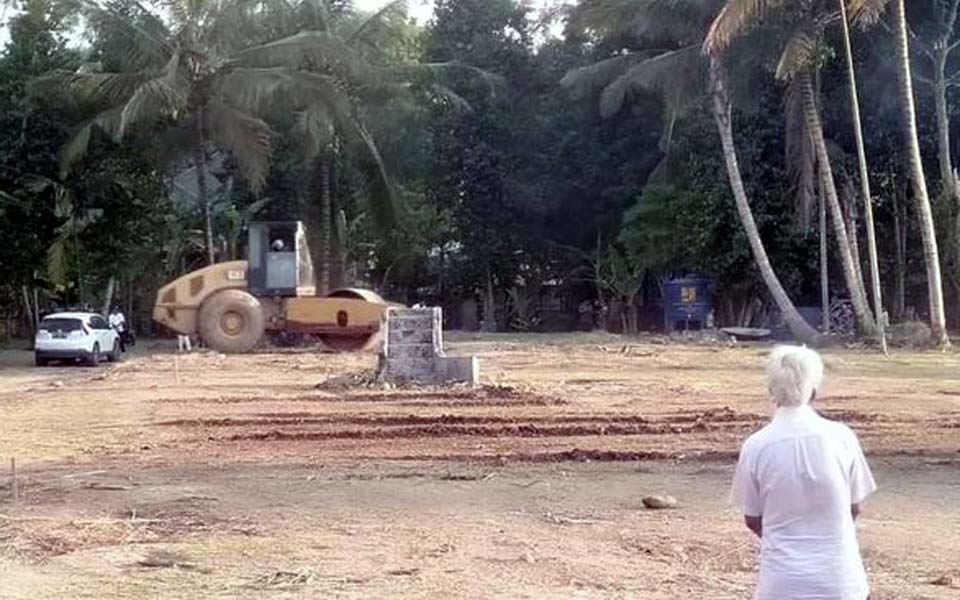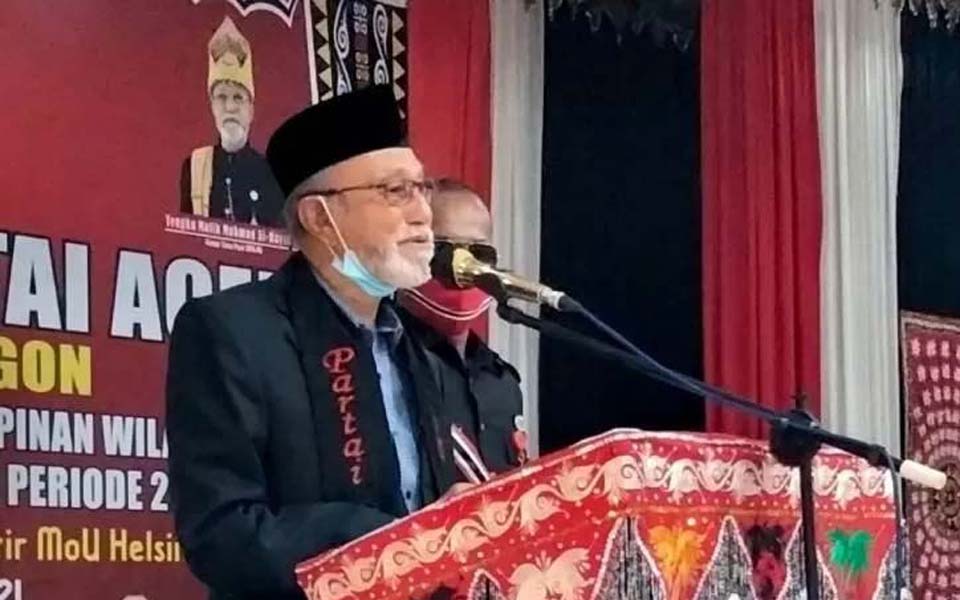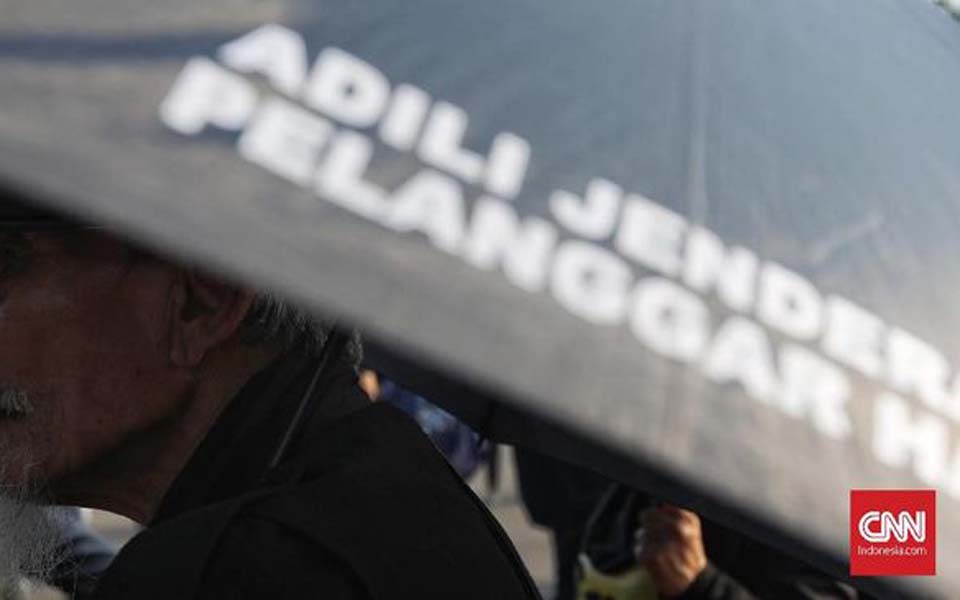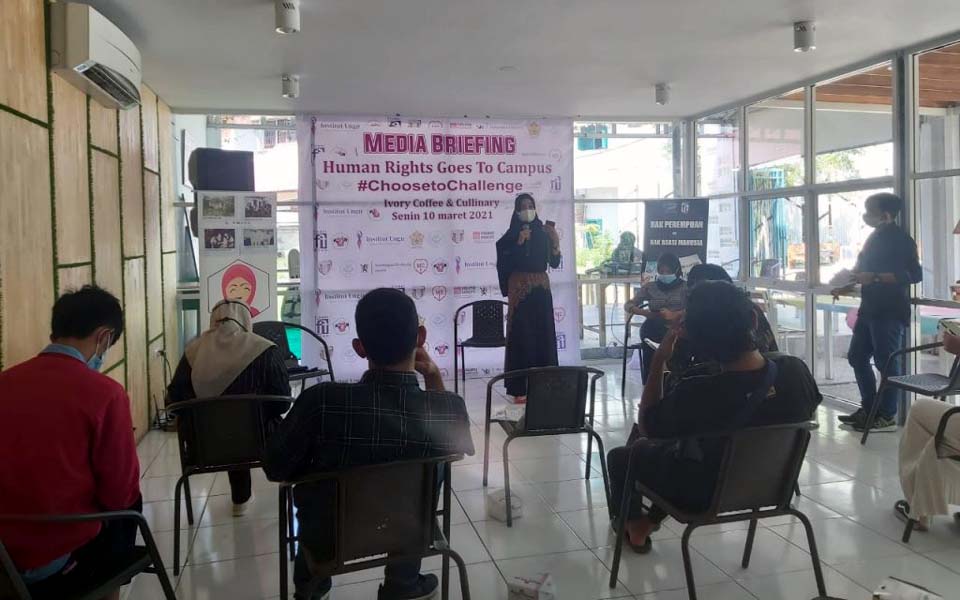[The following petition was initiated by SEGERA, the Solidarity Movement with the People of Aceh and is being circulated among progressive and democratic organisations in Indonesia. This translation has been abridged and edited for readability. Copies of the original petition in Bahasa Indonesia are available on request.]
To all of the people of Indonesia
- In defence of the Acehnese people
- For the sake of universal humanitarianism
- For the sake of upholding the supremacy of law and democracy
- And against a military emergency implemented without democratic political process
The objective reality of what is happening in Aceh since Presidential Decree Number 28/2003 was issued, bringing into force the “Integrated Operation” which declares that Aceh is in a state of emergency (under marshal law), is a bitter fact which is now being experienced by the Acehnese people. The prolonged political conflict which originated from economic and political injustices by the Indonesian government, from the New Order regime [of former President Suharto] through to the present regime of President Megawati Sukarnoputri, has resulted in many civilian casualties.
The military emergency in Aceh has altered the direction of Indonesian politics, moving it from a process of democratic political transition to one of compromise between the military and the civilian authorities. From the start, the TNI [Indonesian armed forces] has made it clear to the public that a resolution to the Aceh problem must be though military means. The military emergency in Aceh was born from the unilateral policies of the TNI. In order to prevent a resolution of the Aceh problem through a “political process”, the TNI launched a campaign in the mass media to stir up sentiment against international involvement, claiming that GAM (the Free Aceh Movement) carried out bomb attacks outside Aceh and failed to adhere to the cessation of hostilities agreement (CoHA) signed by GAM and the government in December.
The military emergency has now been in place for two months but the outcome is obviously far from what the Megawati government claimed it would achieve, that is to crush the GAM separatist movement in six months. The reality as experienced by the people of Aceh is the loss of their civil rights though a series of violent acts by the repressive state apparatus in the form of murders, abductions, rapes, destruction of property, the burning of schools and so forth.
Dirty money which will bring disaster
Indonesia is currently experiencing an economic crisis. As a consequence of declining purchasing power, the level of economic growth in the first quarter of 2003 was only 3.2 per cent, lower than the first quarter of 2002 when growth was 3.8 per cent. Capital, which is piling up in the banking sector, is not being channelled into the productive sectors of the economy and this has retarded the growth of job opportunities.
This was before the economy was hit by the SARS epidemic and the campaign against terrorism which have severely impacted on the tourist and hotel industries. This worsened with the Iraq war because oil policy has now been centralised in the hands of the US, meaning that the oil and gas sector which contributes 30 per cent of foreign exchange earnings to the state is under threat.
The military operation, which represents the key element of the so called integrated operation in Aceh, is being used by the government to neutralise the economic and political crisis. However, it will also have an unavoidable secondary impact because of the huge amount of money drawn from the state budget to pay for the military operation, the final total of which cannot be predicted.
The total funds requested by the TNI to pay for the military operation is 1.24 quintillion rupiah, compared to the budget of 400 billion for the humanitarian operation. Despite this, it has been admitted that the use of these state funds is being hindered by factors such as security and the failure of local governments to function effectively. The irony is that if security is the obstacle to the rehabilitation of the economy in Aceh, the amount of funds taken from the state budget for the implementation of CoAH were far less that that being spent on the military operation.
Economic impact of the military operation
It needs to be understood that the military emergency will have an impact on the quality of life of the Indonesian people in general and the suffering that is being experienced by the Acehnese people in particular. State spending to pay for the military operation has already resulted in cuts to subsidies in other sectors. In Aceh, the military emergency has resulted in a reduction in people’s quality of life, as a consequence of the forced evacuation of more than 40 thousand people and the destruction of educational infrastructure and schools.
The total number of people living in poverty in Aceh is estimated to be 1.6 million, or 40 per cent of the total population of 4.1 million people. This has increased dramatically since the conflict broke out. In 2000, the total number living in poverty was 26.5 per cent or 1.1 million people. This increased in 2001 to 1.2 million people or 30.43 per cent of the population, and in 2002 it increased again to 1.4 million people or 33.43 per cent of the total population.
The conflict and the impact it has had on people’s ability to seek the basic necessities of life has also resulted in increased levels of unemployment. By the end of 2002, around 7.27 per cent of the population or 126,000 people were unemployed. In 2003 after the military operation began the level of unemployment increased two fold, and may increase to three times this level.
Direct impact of the military operation
Three hundred and forty two civilians have fallen victim in the first month of the military emergency. Of this number, 176 people have been declared dead, 101 were detained and tortured, 50 were arrested and 15 have disappeared and their whereabouts remain unknown. Of those killed, the majority died as a result of extra-judicial killings, in which bodies were found with bullet wounds. Mass graves have also been found in a number of locations including in the regencies of Nisam in North Aceh, Manggamat in South Aceh and Takengon in Central Aceh. It is estimated that hundreds of civilians in these three regencies have been killed and buried in mass graves. Compare this to the 204 GAM members who have been killed and 112 who have been arrested.
Based on these facts, the military emergency has totally failed to reduce the number of civilian and non-combatant casualties in Aceh.
Cases of rape
As well as case of murder, torture and arrest, in the month of June there were four cases of rape by TNI soldiers and police. In one of these four cases, which occurred on June 18, a junior high school student was raped in Biruen. The three other cases, which occurred on June 21, 22 and 23, involved women from the village of Paya Bakong, North Aceh.
Refugees
Since June 18, the total number of refugees in Aceh has reached 40,919 covering 16 locations in 10 regencies. Broken down by regency, this includes 16,060 people in Bireun, 10,302 in South Aceh, 4,581 in Aceh Timiang, 4,099 in East Aceh, 1,956 in Pidie, 1,377 in West Aceh, 1,052 in Central Aceh, 130 in Aceh West Daya and 756 in Singkil.
Burning of schools
The excesses of the military emergency has also resulted in the destruction of health and education infrastructure. In June, 505 schools were burnt down, including 360 primary schools, 77 junior high-schools and 68 religious schools. Fifteen health service centres, one government health centre, six community health centres and nine village poly-clinics. Meanwhile 38 public vehicles, trucks and tankers have been torched. Due to the extremely repressive nature of the situation on the ground, exact figures are unavailable.
Violence against human rights volunteers
As well as non-combatants, there has also been violence against human rights volunteers working in the field. One example of this was the murder of a Commission for Missing Persons and Victims of Violence (Kontras) Aceh volunteer in North Aceh, Muzakkir Abdullah, who was abducted on June 16. The victim was found dead on June 17, with his hands tied behind a tree, his mouth gagged, throat slit, and his entire body covered with torture marks. Other incidents include the arrest of a Kontras Aceh volunteer in the Pidie district on June 19 by security forces during a raid on his home. After being held for one week by police, the victim was finally released after being threatened and intimidated. As a result of this violence many human rights volunteers have gone into hiding or fled Aceh.
Violence and intimidation against the press
The limitations on the press coverage of the war, or their inability to seek direct conformation from other sources such as GAM, has resulted in the reporting on Aceh being one sided. The military operational commander has instituted a number of new regulations, including the requirement that special permission must be obtained by domestic and international journalists to work in Aceh, limits on direct local coverage, the creation of a media centre as the only source of information, the prohibitions on seeking clarification from GAM, censorship of reports and obliging journalists to participate in “military training for journalists”.
As well as these limitations there has also been physical violence against journalists. Two journalists from the newspaper Koran Tempo in Padang Tiji, one reporter from 68 H Jakarta in South Aceh and one member of a TVRI crew in Banda Aceh have been so far been found dead.
Given the above considerations, we present this petition and statement of concern on behalf of the suffering Acehnese people and call on the Indonesian government to:
- revoke the military emergency status in Aceh as stipulated in Presidential Decree Number 28/2002 declaring a military emergency;
- revoke Presidential Instruction Number 43/2003 which prohibits visits to Aceh by the foreign press and non-government organisations;
- withdraw all non-organic troops from Aceh immediately;
- seek to resolve the Aceh problem though dialogue which provides an opportunity for Acehnese civil society to be involved in resolving the Aceh conflict politically and under international mediation.
Petition in defence of the suffering Acehnese people
Solidarity Movement with the People of Aceh
Jakarta, August 2, 2003





